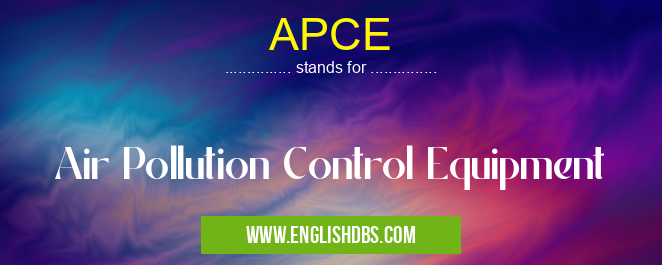What does APCE mean in ENVIRONMENTAL
Air Pollution Control Equipment (APCE) is a vital component in reducing air pollution and ensuring the well-being of communities. It refers to a wide range of technologies and devices designed to remove pollutants from industrial and commercial processes. These pollutants may include particulate matter, hazardous gases, and volatile organic compounds (VOCs), which can have detrimental effects on human health and the environment.

APCE meaning in Environmental in Governmental
APCE mostly used in an acronym Environmental in Category Governmental that means Air Pollution Control Equipment
Shorthand: APCE,
Full Form: Air Pollution Control Equipment
For more information of "Air Pollution Control Equipment", see the section below.
Types of APCE
APCE systems vary in design and functionality, depending on the specific pollutants they are intended to control. Common types include:
- Electrostatic precipitators: Remove particulate matter by electrically charging and collecting it on plates.
- Baghouses: Use fabric filters to capture and hold particulate matter.
- Scrubbers: Employ water or other liquids to remove gases and particulate matter.
- Catalytic converters: Convert harmful emissions, such as carbon monoxide and nitrogen oxides, into less toxic substances.
- Biofilters: Utilize microorganisms to break down and remove organic pollutants.
Benefits of APCE
The implementation of APCE systems provides numerous benefits for both the environment and public health:
- Reduced air pollution: APCE systems effectively remove pollutants from industrial emissions, improving air quality.
- Health protection: By mitigating air pollution, APCE helps prevent respiratory and cardiovascular illnesses, as well as other health issues associated with poor air quality.
- Environmental conservation: APCE systems contribute to the preservation of ecosystems and biodiversity by reducing the release of harmful chemicals into the environment.
- Compliance with regulations: Businesses and industries can comply with government regulations and standards for air pollution control through the use of APCE.
Importance of APCE
APCE plays a critical role in protecting the health of individuals and communities by reducing exposure to harmful air pollutants. It is an essential investment for industries that generate emissions and for governments seeking to improve air quality. The continued development and implementation of APCE technologies is crucial for creating a cleaner and healthier environment for future generations.
Essential Questions and Answers on Air Pollution Control Equipment in "GOVERNMENTAL»ENVIRONMENTAL"
What is Air Pollution Control Equipment (APCE)?
Air Pollution Control Equipment (APCE) consists of devices, systems, or technologies designed to reduce or eliminate air pollutants released into the atmosphere from various sources. These pollutants can be particulate matter, gases, or fumes. APCE helps safeguard public health, protect the environment, and comply with air quality regulations.
What are the different types of APCEs?
APCEs can be classified into several types based on their functionality and the pollutants they target. Some common types include:
- Particulate control devices: Capture or remove particulate matter (e.g., cyclones, filters, electrostatic precipitators)
- Gas control devices: Absorb, neutralize, or oxidize gaseous pollutants (e.g., scrubbers, catalytic converters)
- Fume control devices: Condense or collect fumes (e.g., condensers, scrubbers)
How do APCEs work?
APCEs utilize various mechanisms to control air pollution. Particulate control devices separate particles from the airstream, while gas control devices react with or absorb pollutants. Fume control devices cool and condense fumes, capturing them for further treatment or disposal. The specific operating principle depends on the type and design of the APCE.
What are the benefits of using APCEs?
Implementing APCEs offers numerous benefits, including:
- Improved air quality: Reduced emissions of harmful pollutants, leading to cleaner and healthier air.
- Environmental protection: Mitigation of air pollution's negative impacts on ecosystems, vegetation, and wildlife.
- Compliance with regulations: Adherence to air quality standards and legal requirements.
- Reduced health risks: Minimized exposure to air pollutants, leading to better public health outcomes.
How do I choose the right APCE for my application?
Selecting the appropriate APCE involves considering factors such as:
- Type and concentration of pollutants
- Source characteristics (e.g., flow rate, temperature)
- Space constraints
- Operating costs
- Regulatory requirements Consulting with environmental engineers or APCE manufacturers is recommended for expert guidance.
Final Words: Air Pollution Control Equipment (APCE) is a comprehensive term encompassing various technologies and devices used to remove pollutants from industrial and commercial processes. APCE systems offer significant environmental and health benefits, reducing air pollution, protecting public health, and conserving ecosystems. As industries and governments prioritize air quality improvements, the importance of APCE will only continue to grow in the years to come.
